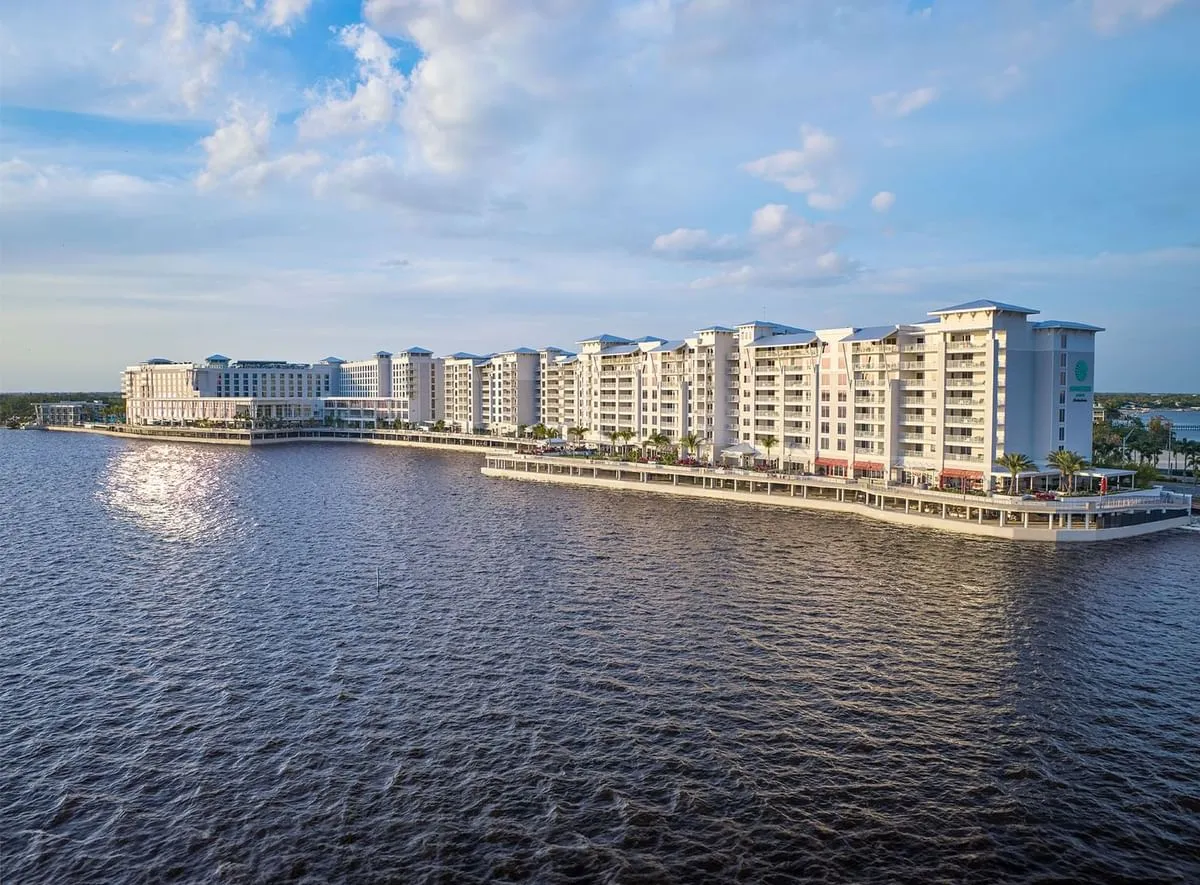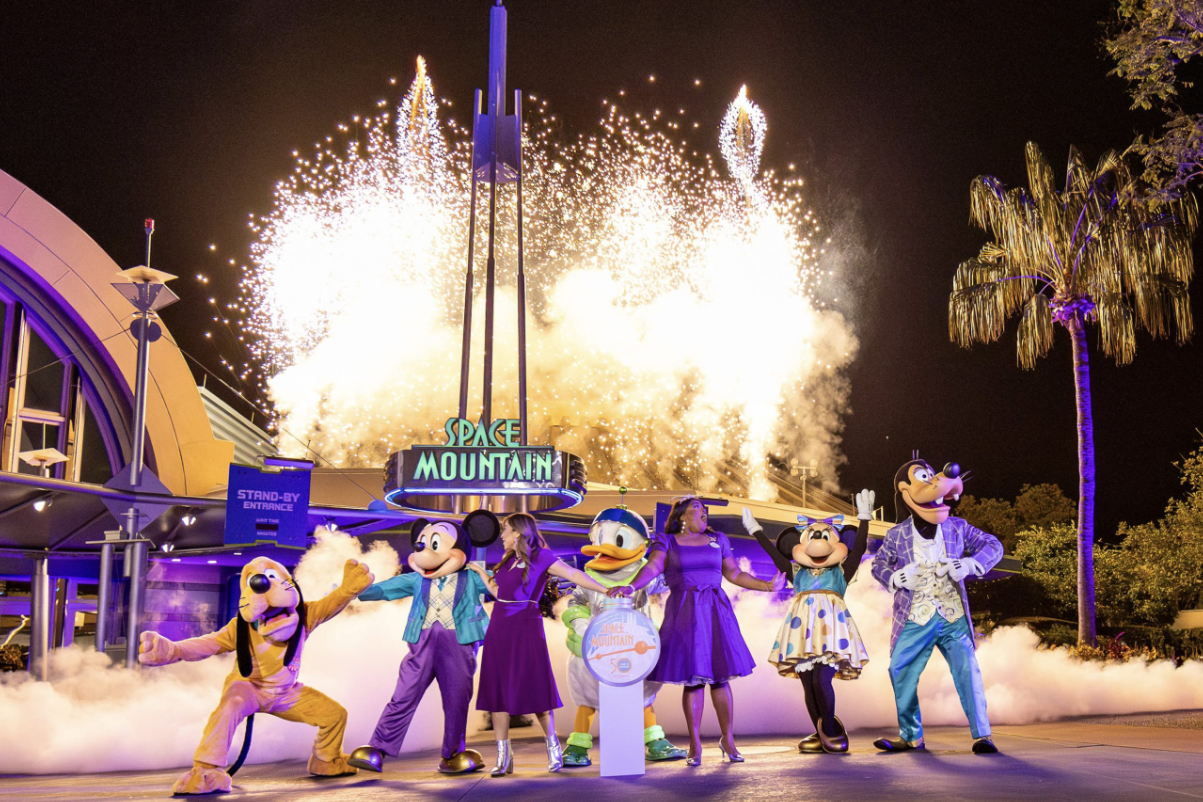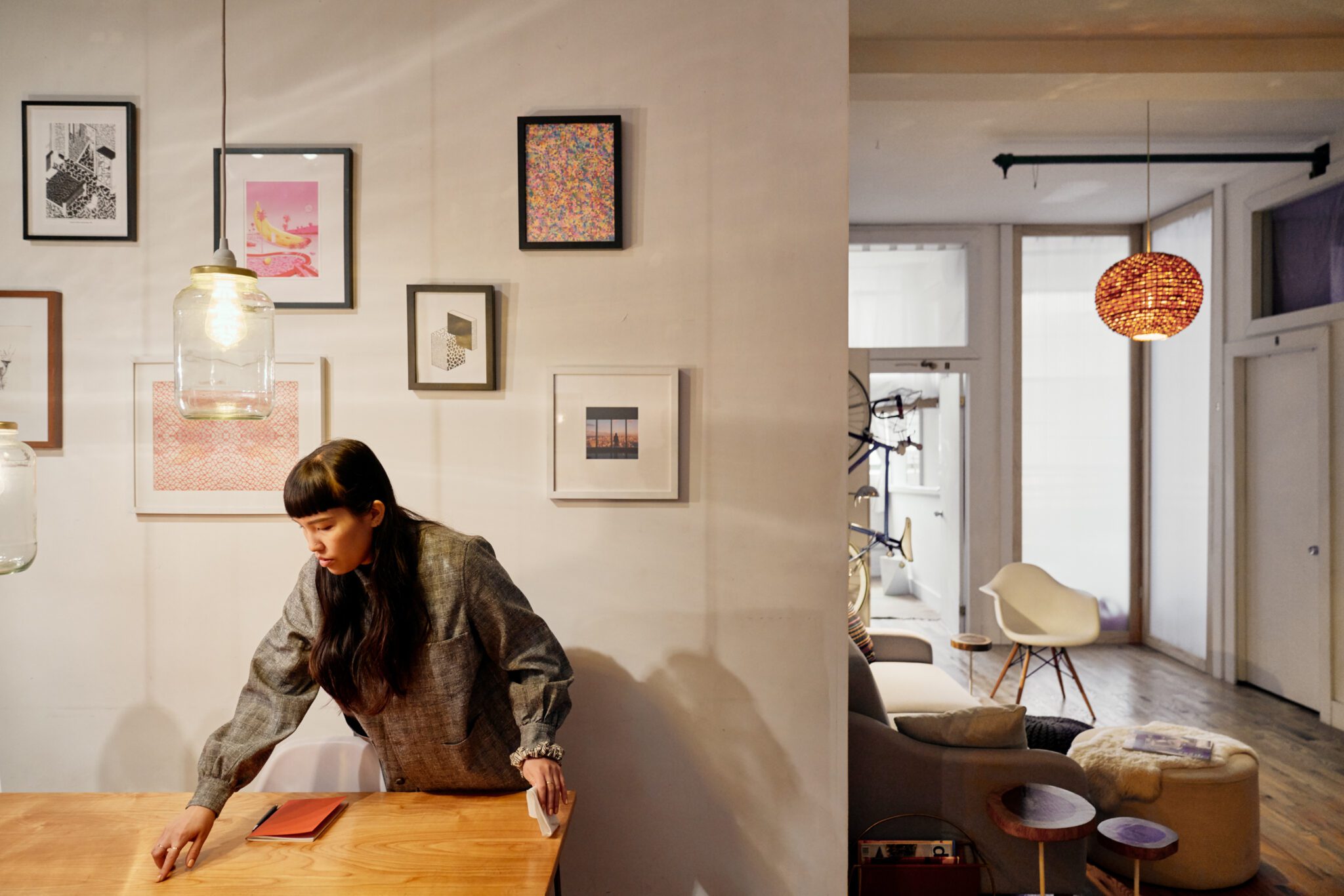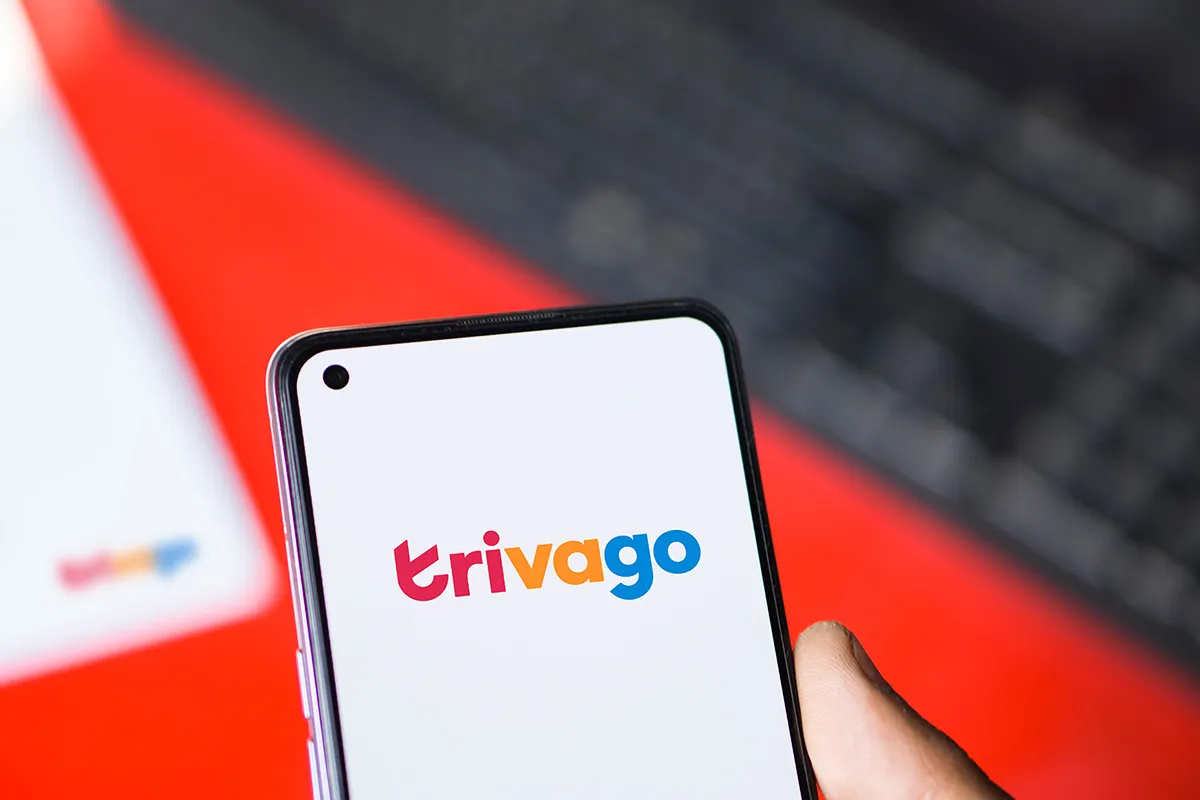How Nihi Hotels Adds a Wild Side to Luxury Travel
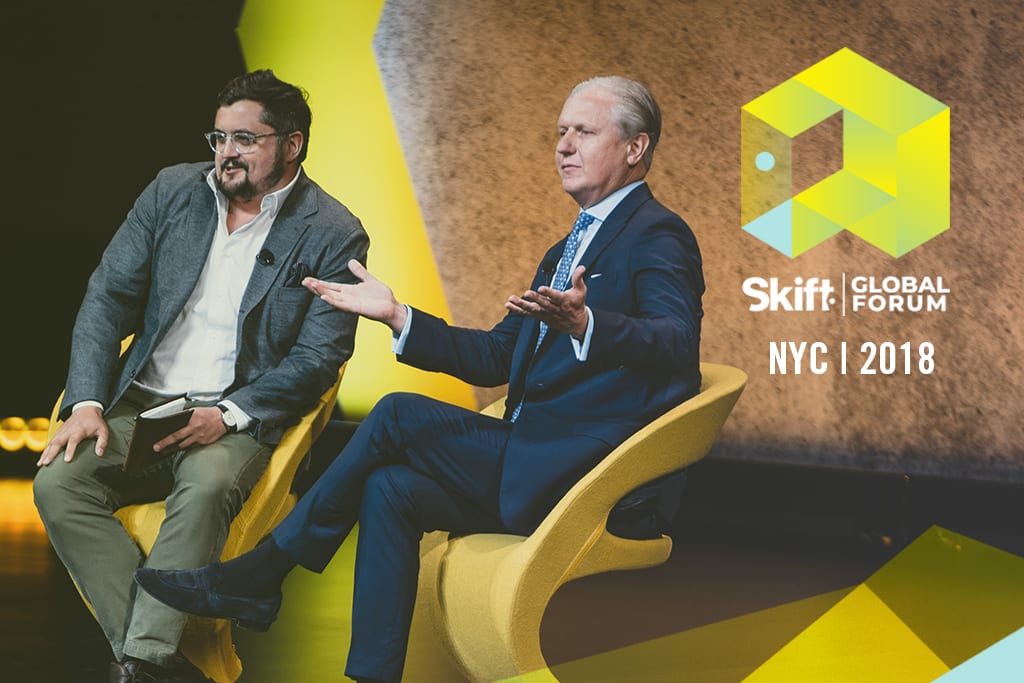
Skift Take
Nihi Sumba isn't your average luxury hotel.
The 33-villa resort is set in around 500 acres of land on an Indonesian island, where, according to Nihi Hotels CEO James McBride, guests rarely ever see a boat in the ocean or a plane in the sky.
This isolation is part of what McBride calls "the edge of wildness."
"It's wild, but our accommodations are chic and elegant but not too much. Everything is at the right level and responsible," McBride told Skift columnist Colin Nagy at the recent Skift Global Forum in New York City.
For McBride, who has spent his career in the hospitality industry, it is about creating a "warm and human" atmosphere not necessarily about striving for the highest luxury standard.
"I got a letter from a guest, [in] which the guest wrote, Mr. McBride, we had the most wonderful time. However, your staff were consistently inconsistent with a consistent smile.
"I read it over—consistently inconsistent—and I said, 'You know, that's about right.'"
McBride is looking to spread this approach to other destinations with a new site planned in Costa Rica. He is also keen on Iceland, Mexico, and Colombia.
READ THE FULL EDITED TRANSCRIPT OF THE INTERVIEW
Skift: Hi everyone I'm Colin Nagy. I write the hospitality column for Skift, called On Experience. I'm joined with James McBride here on the stage today. James has been a lifelong hotelier, an entrepreneur, an interesting business man, and also had a call from his mother at the last minute telling him to wear a tie before he came on stage today. Also, a kind and rooted human. But, to start, there is a quote I really like which is, To break the rules you must first master them. And I think, James, you've worked at the Carlyle, you ran the Carlyle. You worked at the Ritz Carlton, you know you've been a lifetime hotelier at these places that we all hold up to be, you know very rules based and orderly. But I think your whole career's been very contrarian, so what is the role of that kind of contrarian mindset been in everything you've done?
James McBride: A little contrarian. But, firstly I'm truly honored to be here today, Colin. What an incredible group of people, and I'm very humbled and just feel so fortunate. So thank you so much for that. I was born in South Africa, and as he said, my mother called when I was walking in this morning and said This is a big day. Are you wearing a tie? I said, No, Mom. She said, Well, a gentleman always wears a tie. And when your mother is 90 in South Africa you have to listen. So I listened. So, this is for Mother.
I first started at hotel school in Johannesburg, worked at a hotel called the Royal Hotel in Durban. Was in the kitchen in the first year, and did all of the areas, and at the same time, in a very tribal country, and a troubled country it was in 1983-1987. And came to America with my mentor at that point, Ali Kasikci, who is a famed hotelier, lives in California, promising me a job when I arrived in America. So it was a coming to America situation.
There was no job for me when I arrived, and I had to look for one. So, I always had to go to human resources, I remember right by the trash compactor, with the clipboard. Fill out application form. I soon learned that if you go and see the general managers secretary and be nice with her, try and use the accent a little bit and get things going, they send you down and they treat you way, way better when that happens. Needless to say I couldn't find a job.
[My] first job was at a timeshare resort in Carlsbad called the Carlsbad Beach and Tennis resort. And talking about contrarian. Carlsbad Beach and Tennis Resort, first timeshare place. People stayed in the hotel, got the toaster, did a tour, bought timeshare. People bought the timeshare and came, but there were no tennis courts.
So I thought of the idea of making a deal with the high school next door, that people could play tennis at the high school from the morning until three. So people arrived with their rackets, and when they said, |Where's the tennis courts?” We said, “Well, they're at the high school next door, but you have to play it before 3:00.” Needless to say, they weren't happy.
[I] continued on and joined the Ritz Carlton in its infancy in 1988 as a trainee at the Ritz Carlton in Boston. In the Horst Schulze era and was fortunate to open up around 20 hotels all around the world and take the brand to Asia, opening Hong Kong, Singapore, and Kuala Lumpur. And then through the transition into Marriott, opening the first brand at Residence with Millennium Partners and Chris Jefferies's team, in Washington D.C., at 22nd and M. And [I] got to know the Marriott folks, Mr. Marriott, because it was the first opening in that era, which was extraordinary.
That was a very blessed time for me. I learned many things but broke many rules. When I was in Kuala Lumpur, it was during the 1997 Asia crisis. Business was extremely bad. So I thought everyone that came from Singapore, the best way for us to drive demand would to be to give out hot cookies at the airport and change people's plans as they got off the plane.
We did that, we moved about ten people a day. The airport manager then said, Can you do something more elaborate? So I thought about it, and there was a truck outside the window. Kuala Lumpur was still a very basic town and I said, Let's load up all the furniture and move it to the airport. Create a room at the airport with a piano and a piano player. Everyone that got off at the airport, we would give them what was called a VIP visa, and we had cars ready to take them directly to the Ritz Carlton. We moved about fifty people a day, granted the rate was only about $75.00, but it was amazingly successful. I had to see Mr. Marriott at the airport once, and Mr. Marriott came. I was terrified. Luckily, he liked it because we were doing the right thing for the owner, and he was a very eccentric man.
Then to Millennium, this was pre- September 11th, I was hiring the pianist, and the pianist said, Can I have the job to play in the lobby? I said, Only if you play at Reagan Airport between the hours of six and eight thirty and in the evening. Because everyone who gets in the shuttle to go to New York, I want to be sure to give them a gift to their husband or wife and to promote the hotel. He thought I was completely crazy, but we did it. We had an airport, we had a piano, we had soap that we cut for people, and the rest is history with those things.
Skift: Getting into what you've done with Sumba. One of the anecdotes that I thought was very interesting is when you're trying to convince someone from the US to go 28 hours around the world to experience your resort. You want it to feel like the weight of a Rolex, like something that stays with you after. The entire industry is all about experience led, there's been a lot of hyperbole about experience. What are you guys doing that is resonating with a hard to reach audience?
McBride: I think, starting with the Sumba story. Important to note, my business partner Chris Birch, I met him at the Carlyle, and Chris always wanted me to be an entrepreneur with him, and I was always too scared. I was terrified to be honest.
When I was at YTL in Singapore he called me and said there was an island for sale. There was a resort for sale on an island called Sumba. Sumba is the size of Massachusetts or Jamaica and I guarantee you 99.9 percent of you have never heard of Sumba. You need to Google it. It's the size of Jamaica, Massachusetts. There was a surf resort called Nihiwatu. I went to look at it. You could never get there. We helped Chris put the deal together because I was still at YTL and we went down this journey together. With Chris's vision and with the courage to invest in it.
I think at the time from an entrepreneurial perspective, as I'd always been in big, big businesses, to be on the island of Sumba, which is tribal, there was one little hotel on it which was Nihiwatu. People still traded in buffalo, they still carried swords. It is completely wild, they live above their animals, and we were fortunate enough to be able to evolve a very special place already into this total gem that is captured many people's imaginations for them to keep visiting, because of the spirit of the people, the location, and many of the facets that make it special.
Skift: One of the data points I think is really interesting is about 90 percent of the staff of the hotel have actually been trained. The Sumbanese that are working in the hotel. Talk a little bit about how you're building that next generation of hotelier from the ground up.
McBride: Firstly, in Sumba, Sumba was discovered maybe, the resort, twenty years ago by a man called Claude Graves who got malaria 45 times. It's got an extraordinary surf wave, and it's probably one of the only semi-private surf waves in the world. Surfing's become a very popular sport throughout the world. Claude formed a foundation at that point because, let's just say beheading and wild tribal life still existed there, even fifty years ago.
[He]Put a foundation together for the eradication of malaria, education of children and providing potable water to the villages. If that hadn't have been done, it would have been impossible to continue and have a symbiotic relationship with the Sumbanese people. 90 percent of our employees, we have 33 villas on 200 hectares. A big land mass with small business with over 400 employees that work there.
We've become a very huge proponent of the economy but the Sumbanese are absolutely amazing people, and are not perfect my any means. I often will tell the story that it's not my expectation that a Sumbanese employee should know the difference between pinot noir and cabernet. The guests who're staying there, that's their responsibility.
We drive an environment that is driven by the employees. That is, spiritual in many ways, philanthropic in many ways, but the guests can learn from the people that live in Sumba, and can have an experience that they've never had before. That's what we've tried to use as a foundation to continually build it.
Skift: That consistently inconsistent theme is interesting in terms of It's not pitch perfect service but it's very warm and human.
McBride: I got a letter from a guest, which the guest wrote, Mr. McBride, we had the most wonderful time. However, your staff were consistently inconsistent with a consistent smile.
Skift: Which is great.
McBride: I read it over. Consistently inconsistent and I said, "You know, that's about right." If my towels haven't been delivered, they'll say Yes, we'll take your towels. An hour later, you go, Have you got the towels? Yeah we got the towels. Still don't have any towels. Okay, and that's fine. You get away with a lot because of the warmth and the amazing spirit of the individuals that work there. They are extraordinary human beings. But we are always trying to evolve and make it as slick as it can be, but without it being too slick, because that's not what we're looking for.
Skift: I wanted you to unpack the idea, Your brand positioning is the edge of wildness. What does that mean for a guest that's going there that might be used to very polished luxury experience?
McBride: I think On the edge of wildness is something that we put together because we felt it encapsulated what the experience was. You just have to imagine again, and I'll ask you just take a look on the world map and say Sumba Island. You'll see there's this huge land mass called the Forgotten Island. It's wild, but our accommodations are chic and elegant but not too much. Everything is at the right level and responsible. I hate the word eco. When people call us and say eco resort, I don't like eco. I think eco is a cop out, eco's a cheap way for people not to change your sheets, to give you a shitty shower, and to do all of these things…They put a card next to the bed and it's all eco. You know what, it's not. It's called responsible, and being responsible is having a wonderful relationship with the people that are working with you on the island, and it's being responsible in how you build and it's being responsible in every way.
Being on the edge of wildness encompasses all of that, where you don't see an airplane, you barely see a boat in the ocean. There are no shops for you to go to that are close by. It's an all-encompassing experience for you to be completely engaged with the people, with the land and everything that there is to offer.
Skift: One of the things I'm inspired by with this, because it's been an entrepreneurial endeavor for you, in partnership with Chris Birch. How did you get yourself to pull the rip cord and go all in? The role of dabbling versus focus?
McBride: When Chris…was living at the Carlyle, as many people when they get divorced, they live at the Carlyle, or if they have a big leak and they have Chubb Insurance, they live at the Carlyle too. That's what happens. Chris always wanted me to join him.
Before that, in 2007, he gave me a letter and had a wonderful figure in there of what he would take care of me with, but I didn't have the courage to leave, I didn't have the courage to give up my life. The protection and the comfort of being working for a company.
So when he called me when I was at YTL with the Yeoh family, amazing company, he said, Go to Sumba. This is what it is. I drove, I flew there, and you couldn't go. I drove through these hills, and it felt like Africa. And having grown up in Africa and they're tribal, I just said, “You know, I think this place can be something unbelievable.” I said, “If you're going to do this, you can't dabble.”
For the first six months I was dabbling, I was being there once every three months. In May 2013, I said We've got to go all out. I was there for probably two or three weeks for two years building and creating it, doing the marketing. Through Chris and our networks. Fortunately very broad people gave us a chance, we got unbelievable stories.
Travel Indonesia has been an incredible supporter of ours through articles and through obviously, being the best hotel in the world for two years. And Chris's courage. Without Chris, there's no debt in doing those kind of deals. He believed in me and gave me the opportunity and together we were able to do it. Even though there were very dark days. When we were building and it was raining I was getting chased by people with swords, I was saying, My peer group said Where's James? Uh, he's in Bali. No, no, no, where? He's in Sumba. Sumba? He must have really lost it. Midlife crisis, disaster. I thought I had lost it, too, and they said, He's definitely written off. And as it became more and more successful you become more and more brilliant. Because that's how life works.
Skift: They thought you were Colonel Kurtz in the jungle.
McBride: I had gone completely nuts.
Skift: I wanted to talk about what you think the positive role of hospitality can play in the world? Things are a little terrifying, there's a lot of acrimony and division. Why is hospitality important today?
McBride: Firstly, everyone can be in hospitality through all the various platforms. It gives people hope in every type of community. A gentleman called me from Venezuela about seven, eight months ago on LinkedIn. Said would I speak at his MBA class over a video conference?
I said, “Yes”, because I always believe it's important to remember where you came from. Always give back and take care of the people who reach out to you and help you. Who ask for help. He’s actually…in Sumba at the moment. He does all of our digital from Venezuela. And it's helping people and it's giving people opportunity. Our yoga teacher does all of our digital. Nihisumba Insta just a little plug's pretty good. Take a look.
Skift: We have a little bit of time left, but, this has been the small but mighty section, Nihi, small but mighty. What are you going to do next?
McBride: We've got a site in Costa Rica, and I'm very, very big on Iceland. I've been there two or three times in the north. Heliski, salmon, there's just so many things. I think Iceland is fascinating. We've got one or two opportunities in Mexico and I really like Columbia. But it all terrifies me, I have to say. To try and do it again in a different format on the edge of wildness, I'm just humbled and very happy to be here and to have had the success we've had thus far.
Skift: Thank you, everyone.

